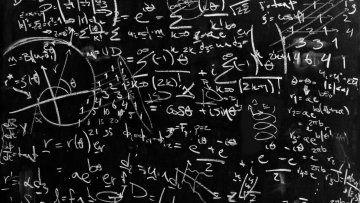What is it like to do mathematical research? Many undergraduates wonder this, as they consider whether they would like to pursue graduate studies. There is no better way for the department to answer the question than to give undergraduates the opportunity to work on their own mathematical research projects. This summer the Oxford Mathematics enabled around 50 students to carry out such projects, working with faculty and postdocs in the department.
Geometric Invariant Theory and its Variation
Abstract
A central tool in the construction of moduli spaces throughout algebraic geometry and beyond, geometric invariant theory (GIT) aims to sensibly answer the question, "How can we quotient an algebraic variety by a group action?" In this talk I will explain some basics of GIT and indicate how it can be used to build moduli spaces, before exploring one of its salient features: the non-canonicity of the quotient. I will show how the dependence on an additional parameter, a choice of so-called 'linearisation', leads to a rich 'wall crossing' picture, giving different interrelated models of the quotient. Time permitting, I will also speak about recent developments in non-reductive GIT, and joint work extending this dependence to the non-reductive setting.
Spectra
Abstract
Spectra provide a way of understanding cohomology theories in terms of homotopy theory. Spectra are a bit like CW-complexes, they have homotopy groups which may be used to characterize homotopy equivalences. However, a spectrum has homotopy groups in negative degrees, too, and they are abelian groups in all degrees. We will discuss spectra representing ordinary cohomology, bordism, and K-theory.
Exponential Motives
Abstract
Numbers like the special values of the gamma and the Bessel functions or the Euler-Mascheroni constant are not expected to be periods in the usual sense of algebraic geometry. However, they can be regarded as coefficients of the comparison isomorphism between two cohomology theories associated to pairs consisting of an algebraic variety and a regular function: the de Rham cohomology of a connection with irregular singularities, and the so-called “rapid decay cohomology”. Following ideas of Kontsevich and Nori, I will explain how this point of view allows one to construct a Tannakian category of exponential motives over a subfield of the complex numbers. The upshot is that one can attach to exponential periods a Galois group that conjecturally governs all algebraic relations between them. Classical results and conjectures in transcendence theory may be reinterpreted in this way. No prior knowledge of motives will be assumed, and I will focus on examples rather than on the more abstract aspects of the theory. This is a joint work with P. Jossen (ETH Zürich).
Motivic Eisenstein cohomology of Hilbert modular varieties
Abstract
Beilinson has given a motivic construction of the Eisenstein cohomology on modular curves. This makes it possible to define Eisenstein classes in Deligne-Beilinson, syntomic, and ´etale cohomology. These Eisenstein classes can be computed in terms of real analytic and p-adic Eisenstein series or modular units. The resulting explicit expressions allow to prove results on special values of classical and p-adic L-functions and lead to explicit reciprocity laws. Harder has more generally defined and studied the Eisenstein cohomology for Hilbert modular varieties by analytic methods. In this talk we will explain a motivic and in particular algebraic construction of Harder’s Eisenstein cohomology classes, which generalizes Beilinson’s result. This opens the way to applications, similar as for modular curves, in the case of Hilbert modular varieties.
Flows on Homogeneous Varieties
Abstract
The so-called Ax-Lindemann theorem asserts that the Zariski closure of a certain subset of a homogeneous variety (typically abelian or Shimura) is itself a homogeneous variety. This theorem has recently been proven in full generality by Klingler-Ullmo-Yafaev and Gao. This statement leads to a variety of questions about topological and Zariski closures of certain sets in homogeneous varieties which can be approached by both ergodic and o-minimal techniques. In a series of recent papers with E. Ullmo, we formulate conjectures and prove a certain number of results of this type. In this talk I will present these conjectures and results and explain the ideas of proofs


